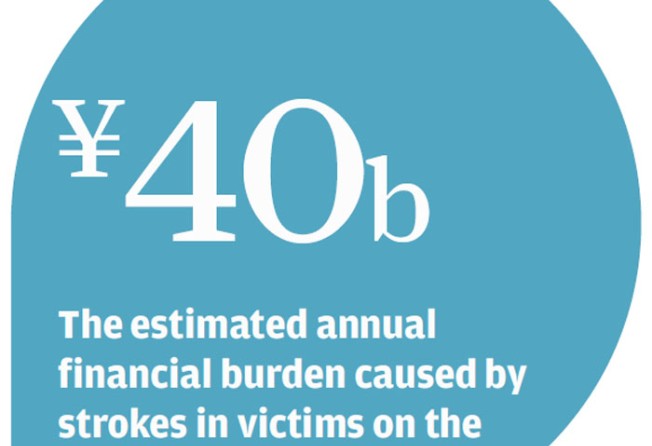
Drug breakthrough may cut dangers of a stroke
One of the best drugs for treating stroke patients can have dangerous side effects. Now scientists have found a way to reduce those risks

A readily available chemical could reduce the risk of cerebral haemorrhage in stroke patients treated with a life-saving drug that breaks down blood clots, a team of Shanghai scientists has discovered.

Strokes are a leading cause of death among mainlanders, and more than 70 million people living in the country have suffered a stroke, China National Radio reported last year, using figures from a national health education forum. About 1.7 million mainlanders a year die from strokes.
The Deputy Health Minister, Ma Xiaowei , said at a stroke conference in Beijing last year that the disease poses a severe challenge.
Dr Zhao Bingqiao , from the Institutes of Brain Science at Fudan University, led the research team in the study. He said a protein called tissue plasminogen activator, which helped break down blood clots and was commonly known as tPA, was one of few drugs effectively proven to treat ischemic stroke patients.
The protein aids in the dissolution of blood clots, but it is given to only a small proportion of people because there is a high probability it can cause brain haemorrhage, and it is effective only when injected in patients within three to six hours of them suffering the stroke.
"In the United States, I know that fewer than 5 per cent of ischemic stroke patients use tPA," Zhao said. "Therefore, we think that if there is a method of reducing haemorrhage, tPA will become more safe and it could be used on more patients, and more people can be saved."
Based on a three-year study, his team found that recombinant ADAMTS13, a readily available chemical found in blood and which can be bought from biopharmaceutical companies, can depress the volume of a haemorrhage by about 40 per cent in ischemic mice that were already injected with tPA.
Dr Guo Hui , president of Shanghai's Quyang Hospital and a leading neurologist, said that Zhao's discovery, which has yet to be tested by further studies, could be a potential treatment for curbing the haemorrhage side effect after treatment with tPA.
"Of course, there is a long, long way to go from the test on mice to clinical use," Guo said. "The application of tPA is controversial, and some people declare that it won't induce haemorrhage. So more studies on this medicine are needed."
The ministry launched a stroke screening, prevention and treatment campaign in 2009 and has checked more than 1.4 million people aged above 40.